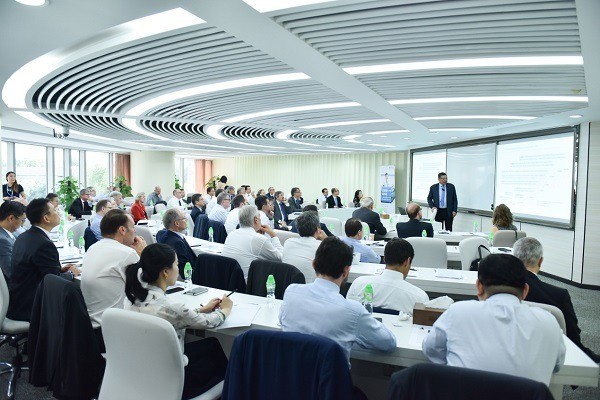On September 7th, CKGSB and the Embassy of Switzerland in China co-hosted an economic and science delegation from Switzerland for a brief breakfast seminar at CKGSB’s Beijing Campus. The 50-strong delegation consisting of representatives from business, politics and the education, research and innovation sector, was in China for a work visit with Swiss Federal Councillor Johann N. Schneider-Ammann, also head of the Federal Department of Economic Affairs, Education and Research.
At the seminar, CKGSB Founding Dean Xiang Bing shed light on China’s transformation and development model over the years, as well as its economic prospects, particularly in light of the recent China-US trade tensions.

Dean Xiang started with China’s economic achievements over the past 40 years, which have been mainly brought by neoliberalism and state capitalism. However, he stressed, there are limitations of this economic development model at the company level, one example being that “China captures very little of the economic value produced in the global supply chain for popular merchandise like Apple’s iPhone.” On socioeconomic level, growth is largely export- and investment-driven, rather than consumption- or innovation-driven.

Dean Xiang Bing then shared his insights on China’s economic prospects. He explained that in comparison to Western countries, the Chinese economy still shows potential for further growth under the neoliberal system, as there are regulations yet to be alleviated. “China’s new growth drivers are deregulation, consumption boom, the social security system and the Belt and Road Initiatives,” explained Dean Xiang.
He also empathized that the Chinese diaspora, overseas Chinese students and the new wave of immigrants will help China to be more connected with the values of the world.
Opportunities Ahead
During the talk, Dean Xiang also explored opportunities for businesses in light of the recent China-US trade friction. He pointed out that from Clinton to Trump, China-US relations have gone through different phases, ranging from embracement to tension. However, he explained that the current relations are to some degree accelerating China’s pace of opening up—China is deregulating in many aspects to attract foreign investment, such as expanding imports and reducing tariffs and other trade barriers, as well as widening market access for foreign investors. In fact, Dean Xiang explained that there are significant opportunities for businesses in sectors yet to be regulated, such as healthcare and telecommunications.
After his speech, the Swiss delegates engaged in a discussion, during which they asked about inequality among regions in China resulting from the country’s development, to which Dean Xiang explained that with the manufacturing industry moving from coastal cities to inland locations, the economic development gap will narrow.
At the end of the seminar, Alain Gaschen, Minister and Deputy Head of Mission of the Embassy of Switzerland in China, expressed his gratitude on behalf of the delegation to CKGSB and Dean Xiang for deciphering China’s economy and its development from both a historical and current perspective. “We hope to have more exchanges and cooperation with CKGSB in the future”, said Mr. Gaschen.

The delegation comprised of officials from the Swiss Parliament and Swiss Federal Department for Economic Affairs, Education & Research; top business leaders including Robert Itschner, Country Managing Director of ABB Switzerland, Peter Hirs, Zurich Insurance Company Asia Pacific Head of Finance; scholars such as Michael Hengartner, President of University of Zurich, and Madeleine Herren-Oesch from the Swiss National Science Foundation. The group visited China to accompany H.E. Johann N. Schneider-Ammann, Switzerland’s Minister for Economic Affairs, Education and Research.